Baking soda, a common household item found in most kitchens, is not just for baking or cleaning. This versatile white powder, also known as sodium bicarbonate, has been used for centuries as a natural remedy. One of the most effective ways to harness the power of baking soda is by adding it to your bath water. A baking soda bath can provide numerous health benefits, from soothing skin irritations to relieving muscle aches.
The alkaline nature of baking soda helps neutralize acids on the skin’s surface. This makes it an excellent choice for individuals with sensitive skin or conditions like eczema and psoriasis. Its anti-inflammatory and antiseptic properties can help reduce redness, itching, and inflammation. In addition, Baking soda also acts as a gentle exfoliant, helping to remove dead skin cells and unclog pores.
In this article, we’ll explore 16 amazing health benefits of taking a bath with baking soda. We’ll dive into the science behind how baking soda works and provide practical tips on how to prepare a baking soda bath for maximum benefit.
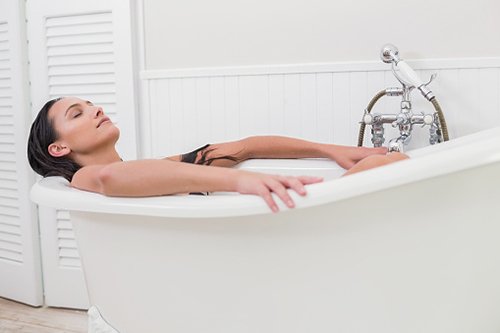
16 Health Benefits of Bath with Baking Soda
Let’s explore the 16 health benefits of taking a bath with baking soda.
1. Relieves Skin Irritation and Itching
Baking soda has anti-inflammatory and antiseptic properties that can help soothe skin irritations, such as itching, rashes, and sunburn. Its alkaline nature helps neutralize acids on the skin’s surface, providing relief from discomfort.
When added to a warm bath, baking soda can help alleviate symptoms of various skin conditions, including eczema, psoriasis, and diaper rash. The soothing properties of baking soda can help reduce redness, itching, and inflammation, leaving your skin feeling calm and refreshed.
2. Detoxifies the Body
A baking soda bath can help detoxify the body by neutralizing acids and removing toxins from the skin. The alkaline properties of baking soda can also help balance the body’s pH levels.
By soaking in a baking soda bath, you can help flush out impurities and promote a healthier, more balanced body. The detoxifying effects of baking soda can help improve circulation, and boost the immune system.
3. Relieves Muscle Aches and Pains
Soaking in a baking soda bath can help relieve muscle aches, pains, and tension. The warm water combined with the anti-inflammatory properties of baking soda can help relax sore muscles and promote healing.
This can be particularly beneficial for athletes, individuals with chronic pain conditions, or anyone experiencing muscle soreness from physical activity or stress. The soothing effects of a baking soda bath can help improve circulation and promote a sense of relaxation and well-being.
4. Softens and Smooths Skin
Baking soda acts as a gentle exfoliant, helping to remove dead skin cells and leaving your skin feeling soft and smooth. Its mild abrasive properties can also help unclog pores and improve skin texture.
By incorporating a baking soda bath into your skincare routine, you can enjoy smoother, more radiant skin. The exfoliating effects of baking soda can help reduce the appearance of fine lines, wrinkles, and age spots. This can promote a more youthful and vibrant complexion.
5. Relieves Diaper Rash
A baking soda bath can be an effective remedy for diaper rash in babies and toddlers. The soothing and anti-inflammatory properties of baking soda can help reduce redness, itching, and irritation caused by diaper rash.
This can provide much-needed relief for both the child and the caregiver, making it a valuable addition to your parenting toolkit. By incorporating a baking soda bath into your baby’s skincare routine, you can help prevent and manage diaper rash.
6. Soothes Insect Bites and Stings
Baking soda’s anti-inflammatory and antiseptic properties can help soothe insect bites and stings. Soaking in a baking soda bath can provide relief from itching and reduce swelling caused by bug bites.
This can be particularly helpful during the summer months when insect bites are more common. The soothing effects of baking soda can help alleviate the discomfort and pain associated with insect bites. This can also promote faster healing and reduce the risk of infection.
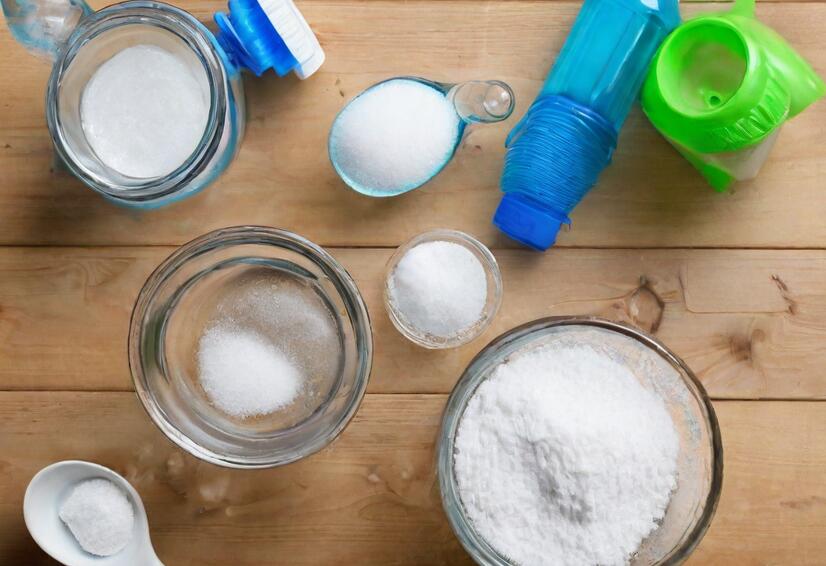
7. Relieves Yeast Infections
A baking soda bath may help relieve symptoms of yeast infections by restoring the natural pH balance of the affected area. The alkaline properties of baking soda can help neutralize the acidic environment that promotes yeast growth.
This can provide temporary relief from the discomfort and itching associated with yeast infections. By incorporating a baking soda bath into your self-care routine, you can help manage the symptoms of yeast infections.
8. Reduces Body Odor
Baking soda’s odor-neutralizing properties can help reduce body odor when added to bath water. It can help absorb and eliminate unpleasant smells, leaving your skin feeling fresh and clean.
This can be particularly beneficial for individuals who experience excessive sweating or have trouble controlling body odor. By incorporating a baking soda bath into your hygiene routine, you can help manage body odor.
9. Soothes Psoriasis and Eczema
Baking soda baths can help soothe and relieve symptoms of psoriasis and eczema. The anti-inflammatory properties of baking soda can help reduce itching, redness, and scaling associated with these skin conditions.
By incorporating a baking soda bath into your skincare routine, you can help manage the symptoms of these chronic skin conditions. The soothing effects of baking soda can help alleviate discomfort, promote healing, and improve overall skin health.
10. Promotes Relaxation and Stress Relief
Taking a warm bath with baking soda can promote relaxation and help relieve stress. The soothing properties of baking soda combined with the calming effects of a warm bath can help you unwind and de-stress after a long day.
This can be particularly beneficial for individuals who struggle with anxiety, insomnia, or other stress-related conditions. By incorporating a baking soda bath into your self-care routine, you can promote a sense of relaxation.
11. Relieves Urinary Tract Infections (UTIs)
Baking soda baths may help relieve symptoms of urinary tract infections (UTIs) by neutralizing the acidic environment that promotes bacterial growth. However, it’s essential to consult with a healthcare professional for proper treatment of UTIs.
Incorporating a baking soda bath into your self-care routine can provide temporary relief from the discomfort and pain associated with UTIs. The alkaline properties of baking soda can help soothe irritation and promote a healthier urinary tract.
12. Soothes Hemorrhoids
Soaking in a baking soda bath can help soothe and relieve symptoms of hemorrhoids. The anti-inflammatory properties of baking soda can help reduce swelling, itching, and discomfort associated with hemorrhoids.
This can provide much-needed relief for individuals experiencing hemorrhoid symptoms. By incorporating a baking soda bath into your self-care routine, you can help manage the symptoms of hemorrhoids.
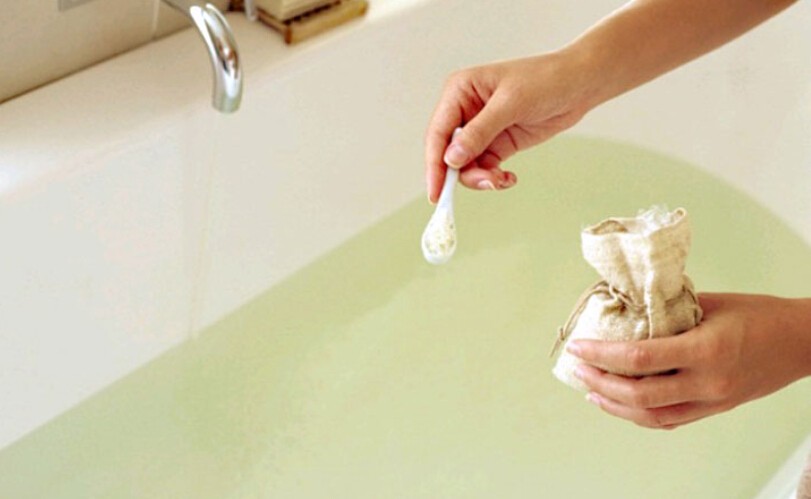
13. Relieves Constipation
A baking soda bath may help relieve constipation by promoting relaxation and reducing stress. The warm water can help relax the muscles in the digestive tract. This makes it easier to pass bowel movements.
By incorporating a baking soda bath into your self-care routine, you can help alleviate the discomfort and strain associated with constipation. The soothing effects of baking soda can help promote regular bowel movements.
14. Soothes Sunburn
Baking soda’s anti-inflammatory properties can help soothe and relieve the pain and redness associated with sunburn. Soaking in a baking soda bath can provide relief and promote healing of sunburned skin.
This can be particularly beneficial during the summer months when sunburn is more common. The cooling effects of baking soda can help alleviate the discomfort and pain associated with sunburn.
15. Relieves Athlete’s Foot
A baking soda bath may help relieve symptoms of athlete’s foot by neutralizing the fungal environment that promotes its growth. The alkaline properties of baking soda can help soothe itching and reduce inflammation caused by athlete’s foot.
Incorporating a baking soda bath into your foot care routine can help manage the symptoms of this common fungal infection. The antifungal properties of baking soda can help prevent the spread of athlete’s foot.
16. Promotes Better Sleep
Taking a warm baking soda bath before bedtime can promote better sleep by relaxing the body and relieving stress. The soothing properties of baking soda combined with the calming effects of a warm bath can help you unwind and prepare for a restful night’s sleep. This can be particularly beneficial for individuals who struggle with insomnia or have difficulty falling asleep. By incorporating a baking soda bath into your bedtime routine, you can promote deeper, more restful sleep.
How to Detox With Baking Soda Bath?
To detox with a baking soda bath, follow these steps:
- Fill your bathtub with warm water, ensuring the water level is deep enough to cover your entire body.
- Add 1/2 to 1 cup of baking soda to the water and stir until it dissolves completely.
- Soak in the bath for 15 to 20 minutes. You can also use a washcloth to scrub your skin while soaking gently.
- After soaking, rinse off with warm water and pat your skin dry with a clean towel.
- It’s important to drink plenty of water before and after your baking soda bath to help flush out toxins from your body.
Warnings about Baking Soda Detox Bath
While baking soda detox baths can be a helpful addition to your health and wellness routine, it’s important to be aware of the following warnings:
- Don’t use too much baking soda: Using too much baking soda in your bath can cause skin irritation, redness, and itching. Stick to 1/2 to 1 cup of baking soda per bath.
- Don’t soak for too long: Soaking in a baking soda bath for too long can dehydrate your skin and lead to further irritation. Aim for 15 to 20 minutes at most.
- Don’t use it if you have open wounds or sensitive skin: Baking soda can be harsh on open or sensitive skin, so it’s best to avoid using it in these cases.
- Don’t use it as a substitute for medical treatment: While baking soda baths can be a helpful addition to your health routine, they should not be used as a substitute for medical treatment. Always consult your doctor if you have a medical condition or are taking medication.
- Stop if you experience discomfort: If you experience any discomfort or adverse effects while soaking in a baking soda bath, stop immediately and rinse off with warm water.
FAQs
1. How much baking soda should I use in my bath?
For a standard-sized bathtub, adding half a cup to one cup of baking soda should be sufficient. Adjust the quantity based on the size of your tub.
2. Can I use baking powder instead of baking soda for a bath?
No, baking powder and baking soda are not interchangeable in baths. Baking soda (sodium bicarbonate) is what you need for the therapeutic effects.
3. Are there any side effects of taking a baking soda bath?
Baking soda baths are generally safe for most people. However, individuals with sensitive skin may experience mild irritation. It’s best to do a patch test before taking a full bath.
4. Can I add essential oils to my baking soda bath?
Yes, adding a few drops of essential oils like lavender or eucalyptus can enhance the bathing experience and provide additional aromatherapy benefits.
5. How long should I soak in a baking soda bath?
To experience the full benefits, aim for a 20 to 30-minute soak. Avoid prolonged baths to prevent over-drying the skin.
6. Can I take a baking soda bath if I’m pregnant?
It’s always best to consult your healthcare provider before trying new therapies during pregnancy. While baking soda baths are generally safe, individual circumstances may vary.

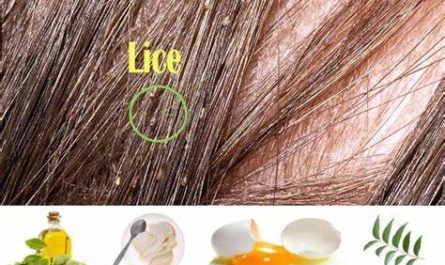



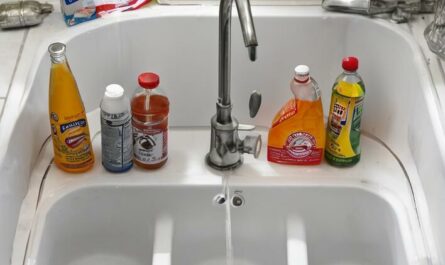
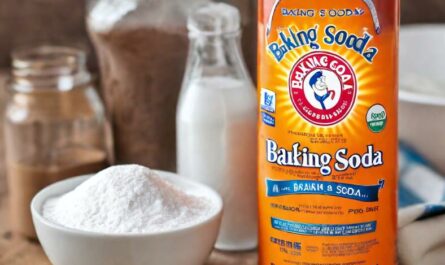
Great information, thanks! However, some of the grammar leaves something to be desired. Please have it proofread by an English teacher or grammarian. Thanks.
It also aides in the PH levels as a female and is very cleansing!